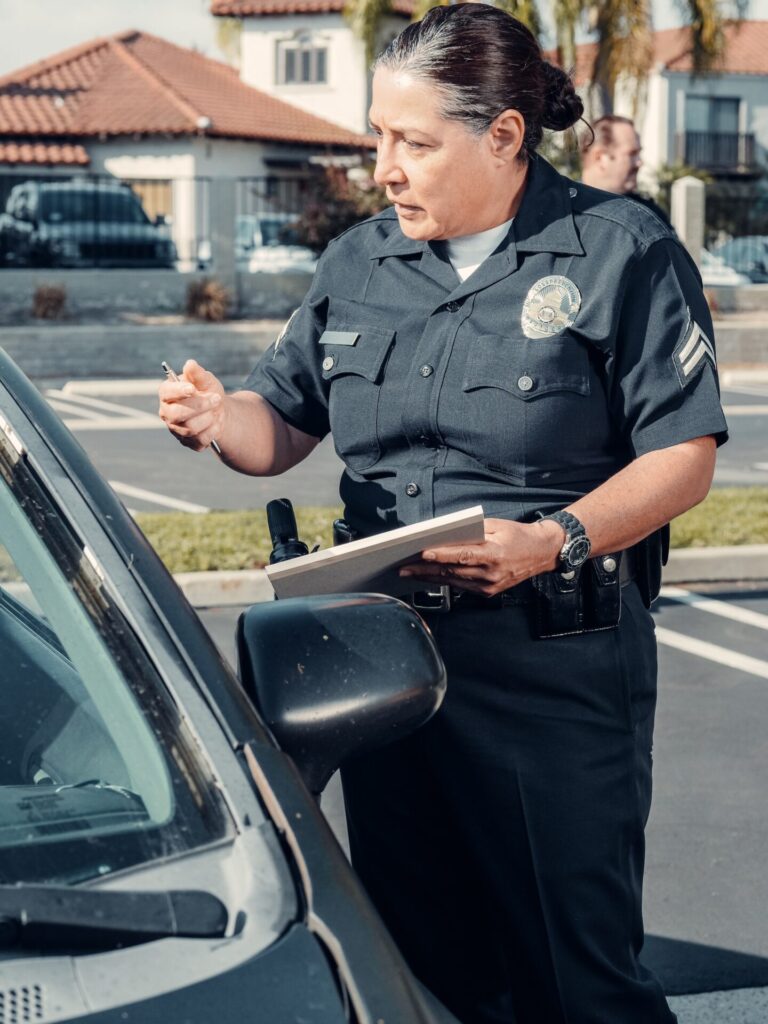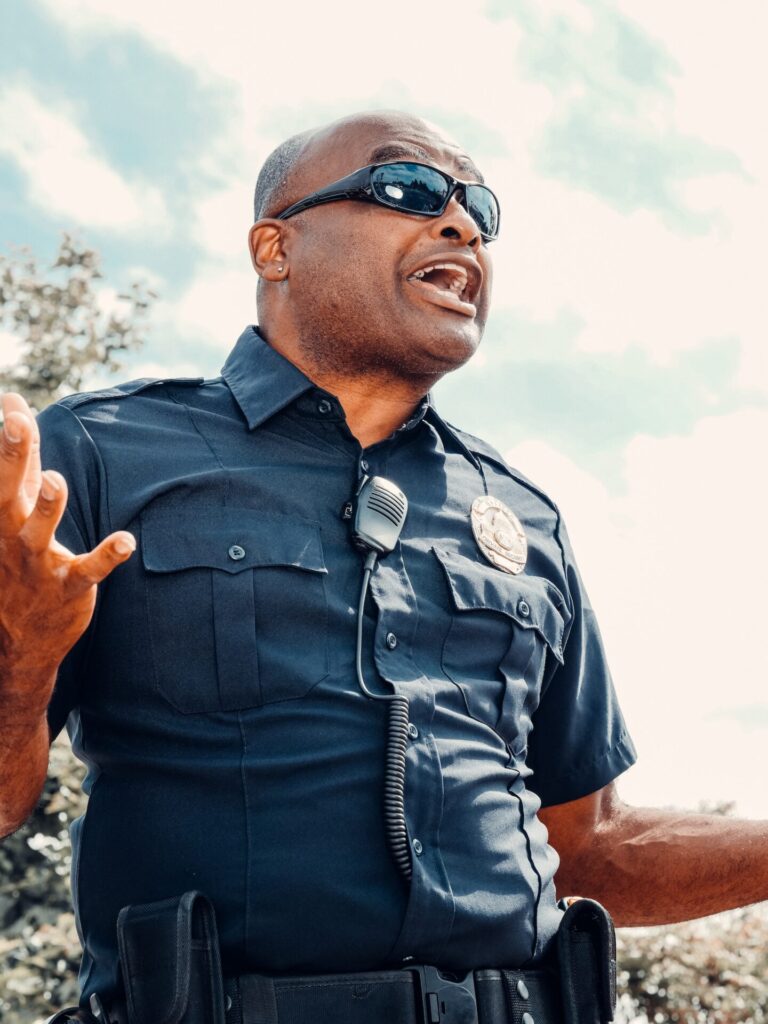PLA is recognized by the Society for Human Resource Management
to offer Professional Development Credits (PDCs) for SHRM-CP® or SHRM-SCP® recertification activities.

Public safety is demanding, and law enforcement professionals confront unique challenges every day. From the complexities of recruitment and retention to heightened accountability and evolving crime-fighting technologies, these hurdles impact every law enforcement officer and their ability to effectively serve.
At Peaceful Leaders Academy, we offer specialized law enforcement conflict resolution training. Our courses are meticulously crafted, blending advanced leadership theories with practical human capital development disciplines. We aim to enhance the leadership skills of law enforcement supervisors and those progressing in their law enforcement careers, strengthening the capabilities of law enforcement agencies and the wider law enforcement organizations.

Benefits of Conflict Resolution Training for Law Enforcement
We understand the immense benefits our conflict resolution training brings to law enforcement professionals. Our comprehensive conflict resolution training for police officers enhances critical aspects of policing, significantly improving officer safety, community relations, and leadership skills.
Improved Communication Skills
In our conflict resolution training program, we emphasize the importance of communication skills for the parties involved in a conflict. We recognize that effective communication, which includes body language, eye contact, active listening, and facial expressions, is essential for law enforcement officers, which enables them to clearly convey strategies and understand diverse community needs.
Our leadership programs for law enforcement officers integrate behavioral science theories and adult learning theory to ensure our messages resonate effectively. This aspect of our program is crucial in building trust between police agencies and the communities they serve.
Crisis Management
Crisis situations require quick, informed decisions. Our conflict resolution training certification programs prepare police officers to manage high-pressure scenarios with competence and calm. We teach law enforcement supervisors leadership theories and practical strategies to effectively navigate such situations and avoid using physical force in the process.
De-escalation Techniques
A key component of our police conflict resolution training involves mastering de-escalation techniques. Our leadership academy curriculum includes modules on conflict management, teaching officers to defuse potentially volatile situations. These de-escalation techniques are vital for preventing conflicts from escalating, thereby protecting both the public and officers.
Positive Impact on Community Relations
We equip any law enforcement officer with tools to foster positive community relations. Trained law enforcement supervisors who understand and can effectively communicate with diverse communities are better positioned to build rapport. This aspect of our program aids in developing community-oriented policing strategies that enhance public trust and cooperation.
Officer Well-being
Recognizing the stressful nature of law enforcement work, our leadership academy courses include components on self-care and mental health. We focus on leadership skills that promote resilience and healthy coping mechanisms, contributing to the overall wellness of law enforcement professionals.
Effective Team Collaboration
Finally, our conflict resolution training fosters effective team collaboration. We teach the parties involved to recognize team strengths, delegate appropriately, and motivate their teams toward common goals. This approach is essential for efficient and effective law enforcement operations.
In our conflict resolution training program, officers from various police departments are encouraged to develop and harness these skills, promoting a cohesive and dynamic working environment. The application of these practices within police departments ensures a stronger, more united front in addressing the challenges faced in law enforcement.
Tailored Curriculum for Law Enforcement Excellence
Our tailored curriculum for law enforcement excellence is meticulously designed to address the unique challenges and responsibilities faced by law enforcement professionals. Our conflict resolution training focuses on developing leadership skills and ensuring law enforcement supervisors are well-prepared to lead with confidence and integrity.
- Public Speaking: Effective communication is vital in law enforcement. Our module on public speaking equips law enforcement with the skills to articulate their thoughts clearly and persuasively, whether addressing the public, their teams, or other stakeholders. This conflict resolution training helps officers present critical information and departmental updates confidently, enhancing their leadership styles.
- Wellness: Recognizing the high-stress nature of law enforcement, our wellness module emphasizes mental, emotional, and physical health. We provide strategies for managing stress and maintaining a healthy lifestyle, which is essential for being an effective leader in demanding environments.
- Culture Belief Systems: Understanding diverse cultural backgrounds is crucial in modern law enforcement. Our culture belief systems module guides police officers in appreciating and navigating various societal dynamics. This understanding fosters respect and improves interactions within the community.
- Conflict Management: Conflict management is a cornerstone of our curriculum. We train law enforcement supervisors and first-line supervisors in resolving conflicts effectively—a skill crucial for maintaining peace and order. This module is particularly beneficial for deputy chiefs and police chiefs who frequently deal with critical issues.
- Ethical and Moral Behavior Issues: In the ethical and moral behavior issues module, we delve into the complexities of ethical dilemmas in criminal justice. Police officers learn to navigate various ethical issues with integrity, a key aspect of police leadership.
- Leading Change: Leading change is designed to prepare law enforcement supervisors for implementing positive change within their departments. We focus on strategies to lead transformational initiatives effectively, which is crucial for progressive police organizations.
- Leadership Concepts: Our leadership concepts module covers fundamental leadership styles and theories. This foundation is vital for staff leadership and helps in developing a versatile approach to leading diverse teams.
- Crisis Leadership: The crisis leadership module prepares officers to lead confidently during emergencies. It includes techniques for quick decision-making, resource management, and maintaining calm under pressure, which are vital skills for law enforcement.
- Theories of Leadership: We delve into various theories of leadership, providing a comprehensive understanding of different leadership approaches. This knowledge aids law enforcement professionals in adapting their leadership style to various situations, which, in turn, enhances their effectiveness in roles ranging from team building to crime prevention.
- Educational Resources: Our curriculum also incorporates specialized modules like grant writing and teaching materials development, aiding in the faculty development workshop and other educational aspects of criminal justice.
Through our diverse and comprehensive leadership courses, Peaceful Leaders Academy is committed to fostering excellence in police organizations and contributing to the development of well-rounded, capable leaders in the law enforcement community.
Fostering Positive Community Relationships
We are deeply invested in fostering positive community relationships through our conflict resolution training and courses. Our focus is not just on enhancing the skills and capabilities of law enforcement supervisors and officers but also on positively influencing public perception and trust between law enforcement and communities.

Impact on Public Perception
Our conflict resolution training programs significantly impact how the community perceives police. Through courses that emphasize empathy, communication skills such as active listening, and cultural sensitivity, we help develop law enforcement leaders who can effectively engage with diverse communities. This transformation in leadership approach plays a pivotal role in shifting public perception from skepticism to trust.
Building Trust
Trust is a critical component of effective community policing. Our program equips police officers with the skills necessary to build and maintain this trust. Courses in our training academy cover topical areas such as ethics, transparency, and community engagement, which are essential for fostering a strong bond between the police and the people they serve.
Collaboration between Law Enforcement and Communities
Collaboration is a key focus of our training officers. We encourage role-playing and real-life scenario-based learning to prepare police officers for active community involvement. These exercises help law enforcement supervisors understand and appreciate the community’s perspective, leading to more collaborative and effective public safety strategies.
Success Stories and Case Studies
In our conflict resolution training, we often include case studies that showcase the impact of well-trained leaders on community policing outcomes. For instance, a police department that implemented our conflict resolution training saw a significant decrease in community complaints and an increase in public cooperation. Another example is a community project led by our program graduates, which resulted in improved police-community relations and reduced crime rates.
Program Focus on Four Generations
Our conflict resolution training also considers the diversity of age groups in the community. We develop skills in our participants to effectively engage with people from all walks of life, respecting their unique experiences and perspectives. This aspect of our training ensures that police officers are well-equipped to serve their communities effectively, regardless of demographic differences.
Management and Leadership Development
Management and leadership development is another key area of our conflict resolution training. We help police organizations develop strategies for effective team building and resource management, ensuring that their departments are well-prepared to meet community needs.
Through our program, Peaceful Leaders Academy is committed to developing law enforcement supervisors and officers who are not just competent in their duties but also deeply engaged in building positive, trusting, and collaborative relationships with the communities they serve.
Contact Us for Customized Training Solutions
At Peaceful Leaders Academy, we urge chiefs and leaders of law enforcement to seize the opportunity for exceptional conflict resolution training. Our conflict resolution training program offers a course specifically designed for your department, emphasizing role-playing, critical skills development, and effective supervision. Our knowledge-rich curriculum is customizable to address your unique needs.
Contact us for a personalized consultation to tailor our conflict resolution training solutions, ensuring they align perfectly with your team’s requirements. Enhance your department’s capabilities with our specialized leadership program and course offerings. Reach out to us today and take the first step in transforming your team’s leadership and skills.
What Our Clients Say

Safa Harak
Project Manager,
Habitat for Humanity
“The program exceeded my expectations. The content was both holistic and specific, the coaches were knowledgeable and supportive, and the course materials were very useful and well-designed.”

Ayla Whittington
Creative Director,
Zen Media
“The content is structured in a way that is easy to understand and the frameworks they built make it memorable. Thank you for creating such an impactful course which has helped me build the foundation of my leadership style.”

Nicole Wingfield
RN Clinic Director,
So Others Might Eat (SOME)
“This course has made me more aware of my weaknesses and strengths as a leader. Most importantly, I’ve learned that leadership is something that will always need cultivating.”









